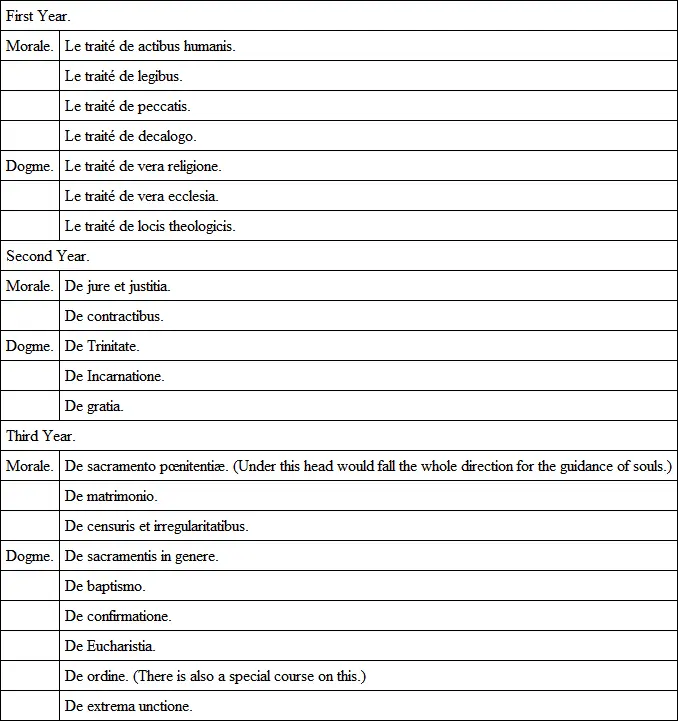Thomas Allies - Journal in France in 1845 and 1848 with Letters from Italy in 1847
Здесь есть возможность читать онлайн «Thomas Allies - Journal in France in 1845 and 1848 with Letters from Italy in 1847» — ознакомительный отрывок электронной книги совершенно бесплатно, а после прочтения отрывка купить полную версию. В некоторых случаях можно слушать аудио, скачать через торрент в формате fb2 и присутствует краткое содержание. Жанр: foreign_antique, foreign_prose, на английском языке. Описание произведения, (предисловие) а так же отзывы посетителей доступны на портале библиотеки ЛибКат.
- Название:Journal in France in 1845 and 1848 with Letters from Italy in 1847
- Автор:
- Жанр:
- Год:неизвестен
- ISBN:нет данных
- Рейтинг книги:4 / 5. Голосов: 1
-
Избранное:Добавить в избранное
- Отзывы:
-
Ваша оценка:
- 80
- 1
- 2
- 3
- 4
- 5
Journal in France in 1845 and 1848 with Letters from Italy in 1847: краткое содержание, описание и аннотация
Предлагаем к чтению аннотацию, описание, краткое содержание или предисловие (зависит от того, что написал сам автор книги «Journal in France in 1845 and 1848 with Letters from Italy in 1847»). Если вы не нашли необходимую информацию о книге — напишите в комментариях, мы постараемся отыскать её.
Journal in France in 1845 and 1848 with Letters from Italy in 1847 — читать онлайн ознакомительный отрывок
Ниже представлен текст книги, разбитый по страницам. Система сохранения места последней прочитанной страницы, позволяет с удобством читать онлайн бесплатно книгу «Journal in France in 1845 and 1848 with Letters from Italy in 1847», без необходимости каждый раз заново искать на чём Вы остановились. Поставьте закладку, и сможете в любой момент перейти на страницу, на которой закончили чтение.
Интервал:
Закладка:
Thursday, July 10. – M. Galais took us over the Séminaire de S. Sulpice. There is nothing remarkable in the building. The pupils are rather more than 200: their appearance is very devout; they seem of low rank in life generally, and this is no doubt the case, but with exceptions; for instance, we heard today of the son of M. Ségur, who is there. Each pupil has a small room to himself, which opens on the corridor; it has a bed, table, little stove, and hardly anything more, with a crucifix and little statue of the Blessed Virgin, belonging to the house. They make their own beds: they are not allowed to enter each other's rooms at all, but, if they wish to speak to one another, the stranger stands in the passage, and the occupant at his door. The whole is under the inspection of the archbishop, who has a chamber here, but does not often come. There are twelve masters. The state of instruction as regards the Church is as follows in France generally. In each diocese there is one or more petits séminaires, which are for children, not only such as are to be ecclesiastics, but laymen also. These are the only schools in which morals and religion are made a primary consideration; and, therefore, though they have nothing to do with the university, and are excluded from all privileges, they are sought after by the sounder part of the community. To these succeeds, for ecclesiastics alone, the grand séminaire for each diocese; this of S. Sulpice is the most eminent in France. The studies are for five years; two in philosophy, three in theology. They are thus arranged, as we took them down from the lips of M. Galais.

Sometimes, perhaps in half the dioceses of France, these two years of philosophy are contracted to one. The three years of theology are thus arranged: —

A course of Holy Scripture twice a-week, exclusive of private study of it.
Authors used: —
Bailly, 8 vols.
Bouvier, Institutiones Theologicæ.
Carrière, De Jure, et Justitia, &c.
Tronson, Forma Cleri.
These three years of theology are sometimes expanded to four.
For the dogma of the Roman Church, M. Galais said, the canons of the Council of Trent, with the acts of the councils generally, were the only authentic or symbolic sources; next to this comes catechismus ad parochos. Bossuet's Exposition is regarded as quite a standard book; likewise Moëhler's Symbolism. He recommended strongly, for the interior life, "Louis de Grenada," "Rodriguez," "S. François de Sales;" spoke highly of Olier's life.
We were greatly pleased with M. Galais' courtesy. He took us also over the library, which is very good indeed; beginning with a complete collection of the Fathers, through the schoolmen, down to modern times: it was arranged chronologically. "He pointed out to us 'Tronson's Forma Cleri' as giving the best idea of their whole discipline." – M. At M. Bonnetty's we found M. l'Abbé d'Alzon, who kindly took us to the convent of the Dames de l'Assomption, Rue des Postes. In passing, we looked into the chapel of the Jesuits, in their house at Paris, which has made such a noise. They are about 20 here, and in all France 210: and these few, but picked and valiant men, fill with dread the hosts of the freethinkers and infidels in France; they know not how to meet them but with persecution. We were greatly interested indeed with the Dames de l'Assomption. We saw the Supérieure and a sister, which latter was English. We had a long conversation, in which she explained the object of their society, lately founded – to communicate a Christian education to the children of the higher ranks, especially of the aristocratie de l'argent, who of all ranks in France are most alienated from religion. The Supérieure spoke with much feeling and intelligence, and with that beauty and distinctness of expression which makes the French language so pleasing in a female mouth. She said they had been much struck, in their experience, with the mass of knowledge and accomplishments which existed out of the Church and the sphere of her influence, or rather in antagonism to her. Beside the usual vows of chastity, poverty, and obedience, they took a fourth – to extend the kingdom of the Saviour to the utmost of their power; and the best means to do this, they thought, was to lay hold of the education of the higher ranks, and impress on it a religious character. 'This could only be done,' she said, 'by a religious congregation; for how can those who live in the world, and seek after its prizes, form their pupils to the contempt of the world? How can those who work for riches themselves teach others to live above them? How, especially, can the children of the rich be strongly impressed with Christian truth save by those who themselves bear the cross?' 'Religious orders,' she said, 'are like branches which, one after the other, spring out of a tree; the trunk itself lasts on, but the branches, it may be, after a time drop off, and give place to others. We do not desire that our order should last when it ceases to be useful, and therefore we have strictly provided that it should possess no funds after the acquisition of the house and garden, which is necessary for our existence: all that we allow is, that any sister may have a pension for life – but this is not necessary; if we find any one of suitable disposition and acquirements, we should be happy to admit her without any. Besides this we receive payments from our pupils: we think it more Christian to work for our living; nor would our pupils be in a comfortable position if they did not pay us.' These sisters recite all the offices of the Breviary in Latin, but not during the night, but anticipating them: they rise at five, go to bed at ten; they attend Mass daily, and have an hour of meditation every morning, and half-an-hour in the evening. 'But,' said M. D'Alzon, 'you know that, wherever there are religious orders, there must be one secret source of strength – intimate union with the Saviour.' 'You mean,' I said, 'that which springs from the Real Presence.' They all agreed; and the Supérieure continued – 'We could never sustain this life, were it not for the thought that we were spouses of Christ – that is the one thought which is the centre of our life.' I said, 'I am sure there are thousands of young persons in England who would enter into religious orders if we had them.' She agreed, and said, 'they must not be purely active, but largely contemplative; there was something pensive and melancholy in the English female character, which shrunk back from a purely active life such as that of the Sisters of Charity.' They were astonished and much gratified when I read to them the Absolution in the Service of the Sick, which pronounces absolution, by virtue of the priestly office, categorically , not declaratively: they agreed that it was perfectly Catholic. The demeanour of these ladies – the four that I saw – struck me exceedingly: it was gentle, perfectly that of ladies, yet intellectual: like that of those who felt they had a noble mission, and had courage to execute it. Their dress also is very becoming – a dark robe with a white hood, and white cross on the centre of the breast. All their servants take the same vows, eat at the same table; the only difference being, that they are less intelligent and accomplished.
In the evening we went for a short time into the gardens of the Tuileries; I had never before seen the orange trees out there, and the gay and cheerful spirit of the scene struck me, so much more brilliant than the aspect of our parks.
Читать дальшеИнтервал:
Закладка:
Похожие книги на «Journal in France in 1845 and 1848 with Letters from Italy in 1847»
Представляем Вашему вниманию похожие книги на «Journal in France in 1845 and 1848 with Letters from Italy in 1847» списком для выбора. Мы отобрали схожую по названию и смыслу литературу в надежде предоставить читателям больше вариантов отыскать новые, интересные, ещё непрочитанные произведения.
Обсуждение, отзывы о книге «Journal in France in 1845 and 1848 with Letters from Italy in 1847» и просто собственные мнения читателей. Оставьте ваши комментарии, напишите, что Вы думаете о произведении, его смысле или главных героях. Укажите что конкретно понравилось, а что нет, и почему Вы так считаете.












